BUSN08030 Learning & Development: Theories, Styles, and Importance
VerifiedAdded on 2023/06/14
|7
|1806
|159
Essay
AI Summary
This essay discusses the importance of learning and development in enhancing individual and organizational performance. It explores various learning theories, including Humanist, Behaviorist, and Cognitive theories, with a focus on Kolb's Experiential Learning Theory and its four-stage cycle. The essay also highlights the relevance of different learning styles, such as Diverging, Assimilating, Converging, and Accommodating, for employees and line managers in improving their skills and abilities. The discussion emphasizes how understanding and applying these theories and styles can lead to more effective learning and development strategies within an organization, ultimately boosting employee motivation, retention, and overall productivity.
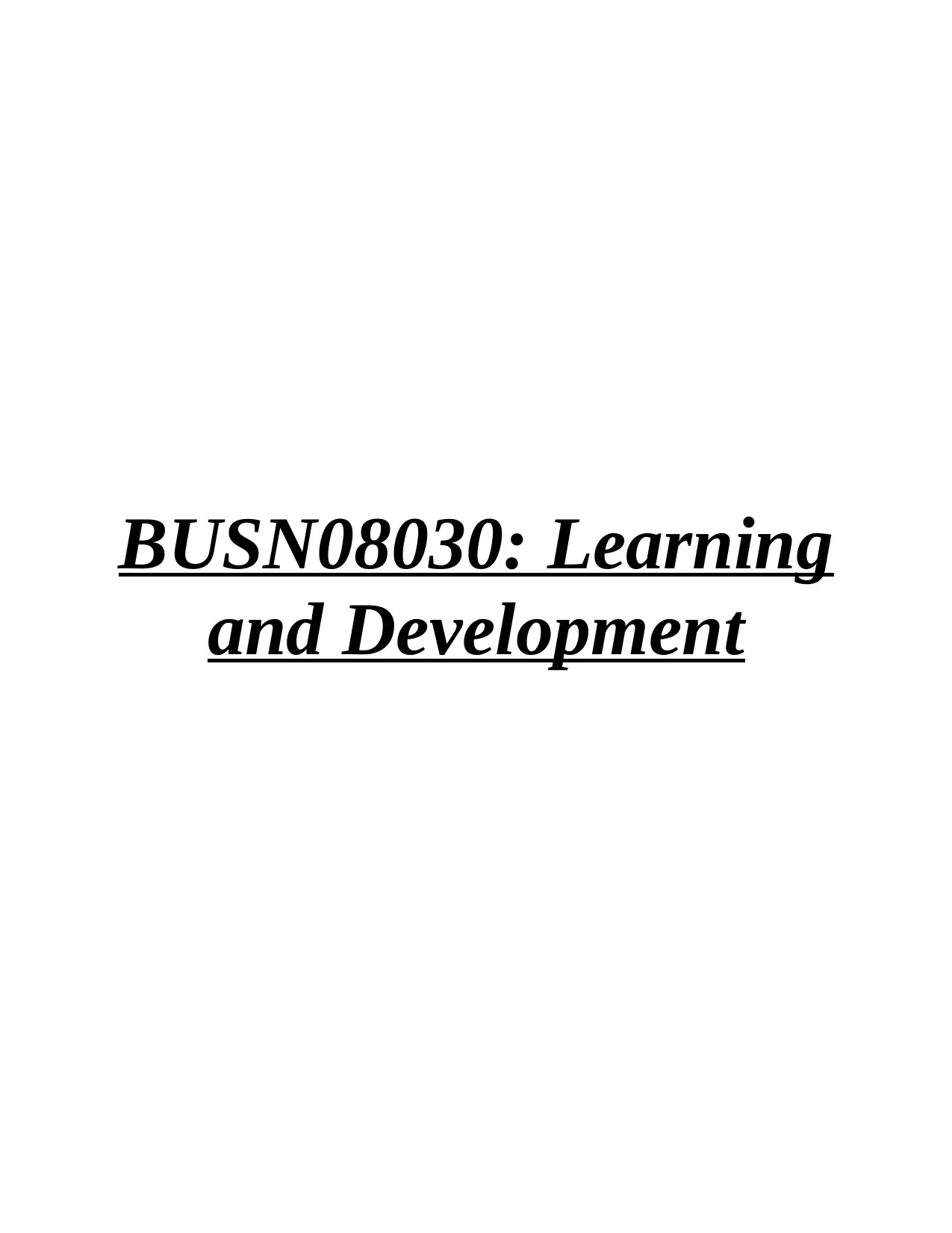
BUSN08030: Learning
and Development
and Development
Paraphrase This Document
Need a fresh take? Get an instant paraphrase of this document with our AI Paraphraser
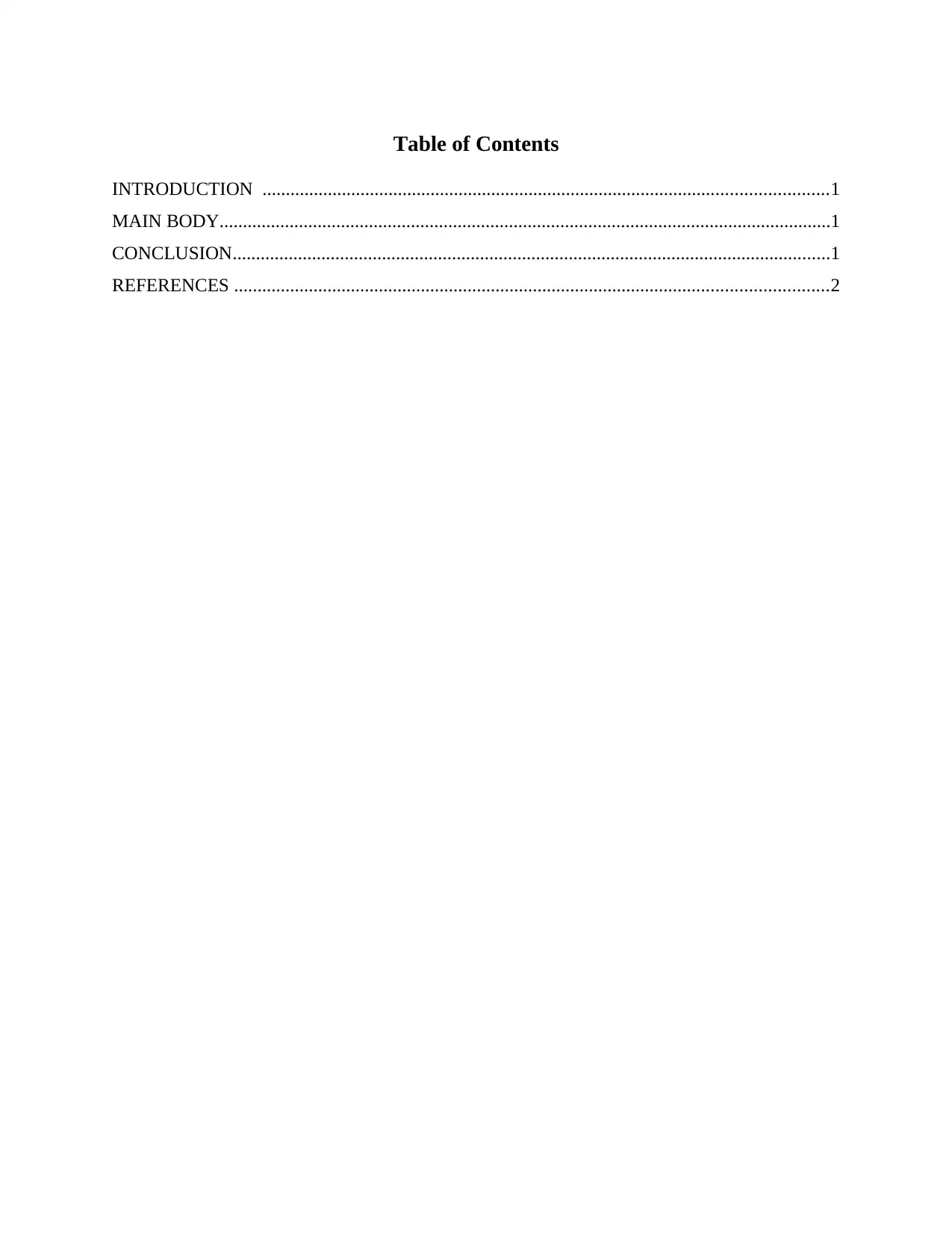
Table of Contents
INTRODUCTION .........................................................................................................................1
MAIN BODY...................................................................................................................................1
CONCLUSION................................................................................................................................1
REFERENCES ...............................................................................................................................2
INTRODUCTION .........................................................................................................................1
MAIN BODY...................................................................................................................................1
CONCLUSION................................................................................................................................1
REFERENCES ...............................................................................................................................2
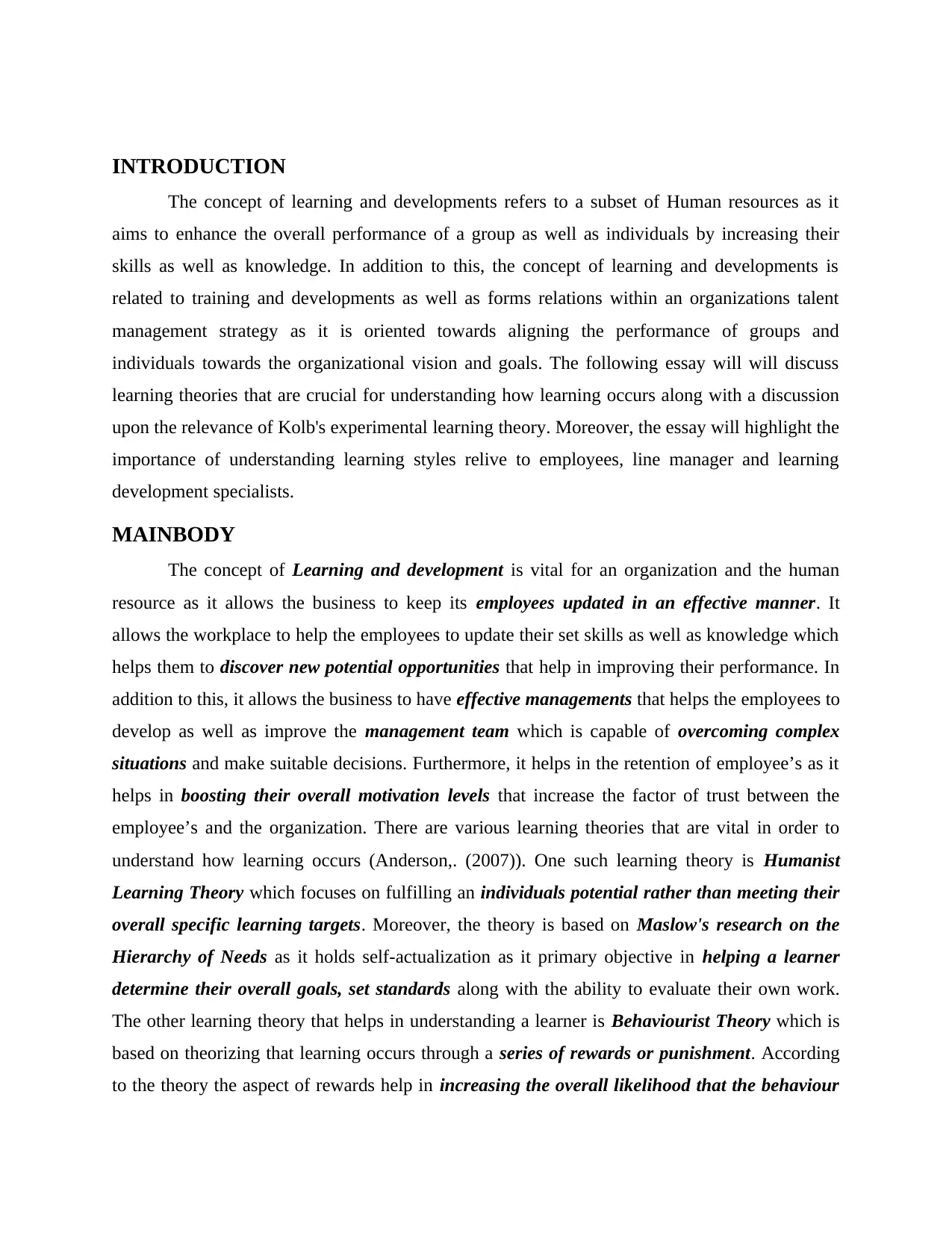
INTRODUCTION
The concept of learning and developments refers to a subset of Human resources as it
aims to enhance the overall performance of a group as well as individuals by increasing their
skills as well as knowledge. In addition to this, the concept of learning and developments is
related to training and developments as well as forms relations within an organizations talent
management strategy as it is oriented towards aligning the performance of groups and
individuals towards the organizational vision and goals. The following essay will will discuss
learning theories that are crucial for understanding how learning occurs along with a discussion
upon the relevance of Kolb's experimental learning theory. Moreover, the essay will highlight the
importance of understanding learning styles relive to employees, line manager and learning
development specialists.
MAINBODY
The concept of Learning and development is vital for an organization and the human
resource as it allows the business to keep its employees updated in an effective manner. It
allows the workplace to help the employees to update their set skills as well as knowledge which
helps them to discover new potential opportunities that help in improving their performance. In
addition to this, it allows the business to have effective managements that helps the employees to
develop as well as improve the management team which is capable of overcoming complex
situations and make suitable decisions. Furthermore, it helps in the retention of employee’s as it
helps in boosting their overall motivation levels that increase the factor of trust between the
employee’s and the organization. There are various learning theories that are vital in order to
understand how learning occurs (Anderson,. (2007)). One such learning theory is Humanist
Learning Theory which focuses on fulfilling an individuals potential rather than meeting their
overall specific learning targets. Moreover, the theory is based on Maslow's research on the
Hierarchy of Needs as it holds self-actualization as it primary objective in helping a learner
determine their overall goals, set standards along with the ability to evaluate their own work.
The other learning theory that helps in understanding a learner is Behaviourist Theory which is
based on theorizing that learning occurs through a series of rewards or punishment. According
to the theory the aspect of rewards help in increasing the overall likelihood that the behaviour
The concept of learning and developments refers to a subset of Human resources as it
aims to enhance the overall performance of a group as well as individuals by increasing their
skills as well as knowledge. In addition to this, the concept of learning and developments is
related to training and developments as well as forms relations within an organizations talent
management strategy as it is oriented towards aligning the performance of groups and
individuals towards the organizational vision and goals. The following essay will will discuss
learning theories that are crucial for understanding how learning occurs along with a discussion
upon the relevance of Kolb's experimental learning theory. Moreover, the essay will highlight the
importance of understanding learning styles relive to employees, line manager and learning
development specialists.
MAINBODY
The concept of Learning and development is vital for an organization and the human
resource as it allows the business to keep its employees updated in an effective manner. It
allows the workplace to help the employees to update their set skills as well as knowledge which
helps them to discover new potential opportunities that help in improving their performance. In
addition to this, it allows the business to have effective managements that helps the employees to
develop as well as improve the management team which is capable of overcoming complex
situations and make suitable decisions. Furthermore, it helps in the retention of employee’s as it
helps in boosting their overall motivation levels that increase the factor of trust between the
employee’s and the organization. There are various learning theories that are vital in order to
understand how learning occurs (Anderson,. (2007)). One such learning theory is Humanist
Learning Theory which focuses on fulfilling an individuals potential rather than meeting their
overall specific learning targets. Moreover, the theory is based on Maslow's research on the
Hierarchy of Needs as it holds self-actualization as it primary objective in helping a learner
determine their overall goals, set standards along with the ability to evaluate their own work.
The other learning theory that helps in understanding a learner is Behaviourist Theory which is
based on theorizing that learning occurs through a series of rewards or punishment. According
to the theory the aspect of rewards help in increasing the overall likelihood that the behaviour
⊘ This is a preview!⊘
Do you want full access?
Subscribe today to unlock all pages.

Trusted by 1+ million students worldwide
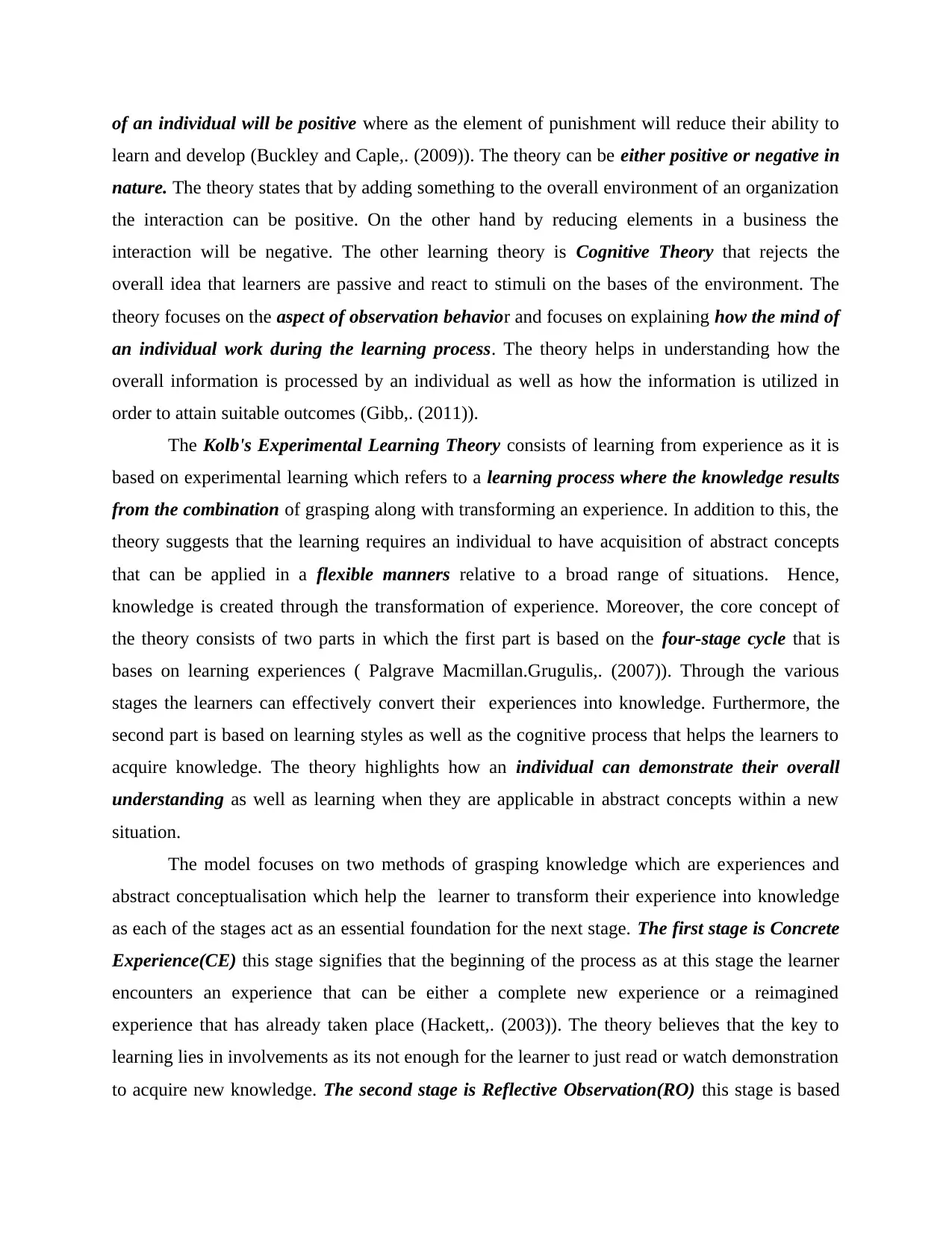
of an individual will be positive where as the element of punishment will reduce their ability to
learn and develop (Buckley and Caple,. (2009)). The theory can be either positive or negative in
nature. The theory states that by adding something to the overall environment of an organization
the interaction can be positive. On the other hand by reducing elements in a business the
interaction will be negative. The other learning theory is Cognitive Theory that rejects the
overall idea that learners are passive and react to stimuli on the bases of the environment. The
theory focuses on the aspect of observation behavior and focuses on explaining how the mind of
an individual work during the learning process. The theory helps in understanding how the
overall information is processed by an individual as well as how the information is utilized in
order to attain suitable outcomes (Gibb,. (2011)).
The Kolb's Experimental Learning Theory consists of learning from experience as it is
based on experimental learning which refers to a learning process where the knowledge results
from the combination of grasping along with transforming an experience. In addition to this, the
theory suggests that the learning requires an individual to have acquisition of abstract concepts
that can be applied in a flexible manners relative to a broad range of situations. Hence,
knowledge is created through the transformation of experience. Moreover, the core concept of
the theory consists of two parts in which the first part is based on the four-stage cycle that is
bases on learning experiences ( Palgrave Macmillan.Grugulis,. (2007)). Through the various
stages the learners can effectively convert their experiences into knowledge. Furthermore, the
second part is based on learning styles as well as the cognitive process that helps the learners to
acquire knowledge. The theory highlights how an individual can demonstrate their overall
understanding as well as learning when they are applicable in abstract concepts within a new
situation.
The model focuses on two methods of grasping knowledge which are experiences and
abstract conceptualisation which help the learner to transform their experience into knowledge
as each of the stages act as an essential foundation for the next stage. The first stage is Concrete
Experience(CE) this stage signifies that the beginning of the process as at this stage the learner
encounters an experience that can be either a complete new experience or a reimagined
experience that has already taken place (Hackett,. (2003)). The theory believes that the key to
learning lies in involvements as its not enough for the learner to just read or watch demonstration
to acquire new knowledge. The second stage is Reflective Observation(RO) this stage is based
learn and develop (Buckley and Caple,. (2009)). The theory can be either positive or negative in
nature. The theory states that by adding something to the overall environment of an organization
the interaction can be positive. On the other hand by reducing elements in a business the
interaction will be negative. The other learning theory is Cognitive Theory that rejects the
overall idea that learners are passive and react to stimuli on the bases of the environment. The
theory focuses on the aspect of observation behavior and focuses on explaining how the mind of
an individual work during the learning process. The theory helps in understanding how the
overall information is processed by an individual as well as how the information is utilized in
order to attain suitable outcomes (Gibb,. (2011)).
The Kolb's Experimental Learning Theory consists of learning from experience as it is
based on experimental learning which refers to a learning process where the knowledge results
from the combination of grasping along with transforming an experience. In addition to this, the
theory suggests that the learning requires an individual to have acquisition of abstract concepts
that can be applied in a flexible manners relative to a broad range of situations. Hence,
knowledge is created through the transformation of experience. Moreover, the core concept of
the theory consists of two parts in which the first part is based on the four-stage cycle that is
bases on learning experiences ( Palgrave Macmillan.Grugulis,. (2007)). Through the various
stages the learners can effectively convert their experiences into knowledge. Furthermore, the
second part is based on learning styles as well as the cognitive process that helps the learners to
acquire knowledge. The theory highlights how an individual can demonstrate their overall
understanding as well as learning when they are applicable in abstract concepts within a new
situation.
The model focuses on two methods of grasping knowledge which are experiences and
abstract conceptualisation which help the learner to transform their experience into knowledge
as each of the stages act as an essential foundation for the next stage. The first stage is Concrete
Experience(CE) this stage signifies that the beginning of the process as at this stage the learner
encounters an experience that can be either a complete new experience or a reimagined
experience that has already taken place (Hackett,. (2003)). The theory believes that the key to
learning lies in involvements as its not enough for the learner to just read or watch demonstration
to acquire new knowledge. The second stage is Reflective Observation(RO) this stage is based
Paraphrase This Document
Need a fresh take? Get an instant paraphrase of this document with our AI Paraphraser
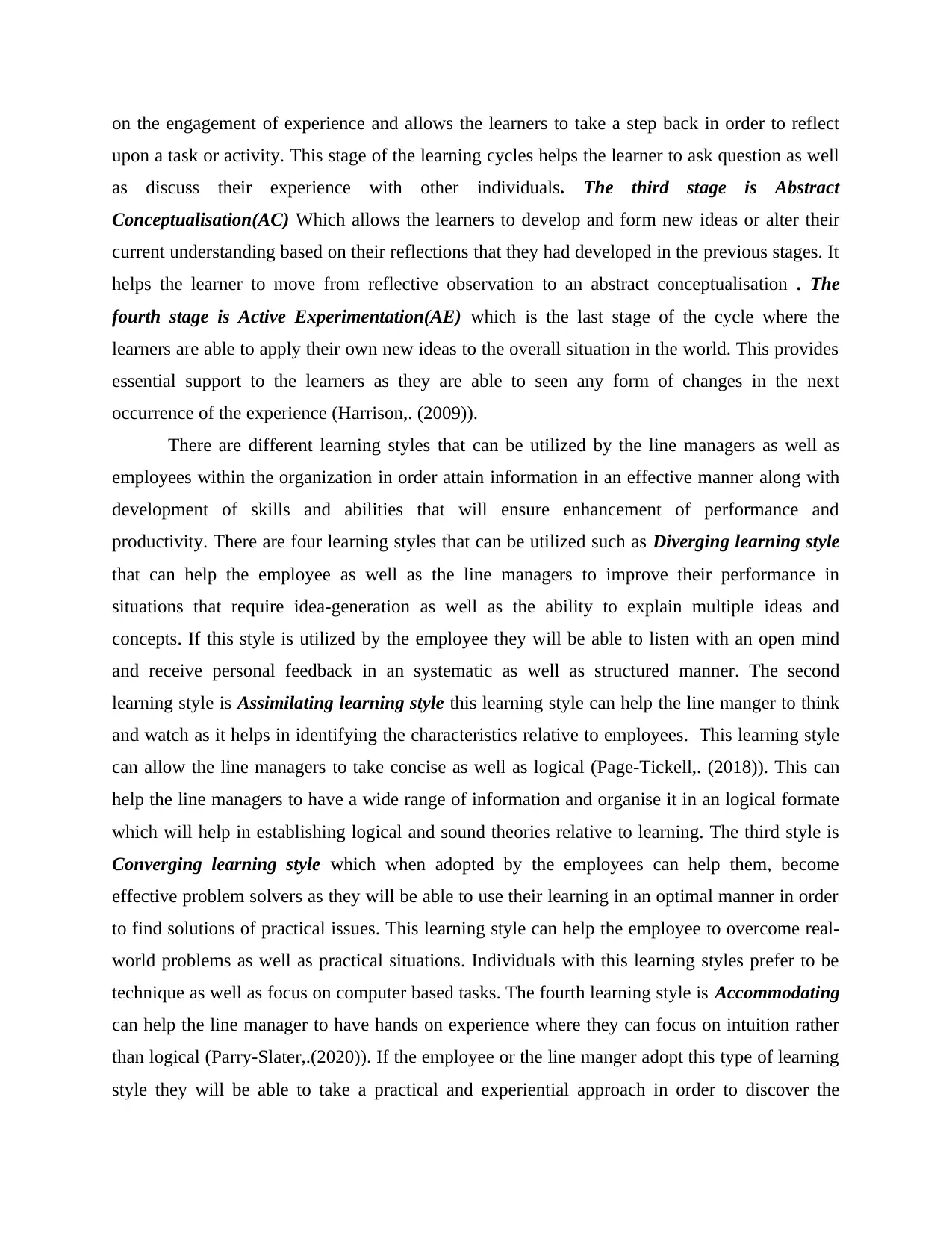
on the engagement of experience and allows the learners to take a step back in order to reflect
upon a task or activity. This stage of the learning cycles helps the learner to ask question as well
as discuss their experience with other individuals. The third stage is Abstract
Conceptualisation(AC) Which allows the learners to develop and form new ideas or alter their
current understanding based on their reflections that they had developed in the previous stages. It
helps the learner to move from reflective observation to an abstract conceptualisation . The
fourth stage is Active Experimentation(AE) which is the last stage of the cycle where the
learners are able to apply their own new ideas to the overall situation in the world. This provides
essential support to the learners as they are able to seen any form of changes in the next
occurrence of the experience (Harrison,. (2009)).
There are different learning styles that can be utilized by the line managers as well as
employees within the organization in order attain information in an effective manner along with
development of skills and abilities that will ensure enhancement of performance and
productivity. There are four learning styles that can be utilized such as Diverging learning style
that can help the employee as well as the line managers to improve their performance in
situations that require idea-generation as well as the ability to explain multiple ideas and
concepts. If this style is utilized by the employee they will be able to listen with an open mind
and receive personal feedback in an systematic as well as structured manner. The second
learning style is Assimilating learning style this learning style can help the line manger to think
and watch as it helps in identifying the characteristics relative to employees. This learning style
can allow the line managers to take concise as well as logical (Page-Tickell,. (2018)). This can
help the line managers to have a wide range of information and organise it in an logical formate
which will help in establishing logical and sound theories relative to learning. The third style is
Converging learning style which when adopted by the employees can help them, become
effective problem solvers as they will be able to use their learning in an optimal manner in order
to find solutions of practical issues. This learning style can help the employee to overcome real-
world problems as well as practical situations. Individuals with this learning styles prefer to be
technique as well as focus on computer based tasks. The fourth learning style is Accommodating
can help the line manager to have hands on experience where they can focus on intuition rather
than logical (Parry-Slater,.(2020)). If the employee or the line manger adopt this type of learning
style they will be able to take a practical and experiential approach in order to discover the
upon a task or activity. This stage of the learning cycles helps the learner to ask question as well
as discuss their experience with other individuals. The third stage is Abstract
Conceptualisation(AC) Which allows the learners to develop and form new ideas or alter their
current understanding based on their reflections that they had developed in the previous stages. It
helps the learner to move from reflective observation to an abstract conceptualisation . The
fourth stage is Active Experimentation(AE) which is the last stage of the cycle where the
learners are able to apply their own new ideas to the overall situation in the world. This provides
essential support to the learners as they are able to seen any form of changes in the next
occurrence of the experience (Harrison,. (2009)).
There are different learning styles that can be utilized by the line managers as well as
employees within the organization in order attain information in an effective manner along with
development of skills and abilities that will ensure enhancement of performance and
productivity. There are four learning styles that can be utilized such as Diverging learning style
that can help the employee as well as the line managers to improve their performance in
situations that require idea-generation as well as the ability to explain multiple ideas and
concepts. If this style is utilized by the employee they will be able to listen with an open mind
and receive personal feedback in an systematic as well as structured manner. The second
learning style is Assimilating learning style this learning style can help the line manger to think
and watch as it helps in identifying the characteristics relative to employees. This learning style
can allow the line managers to take concise as well as logical (Page-Tickell,. (2018)). This can
help the line managers to have a wide range of information and organise it in an logical formate
which will help in establishing logical and sound theories relative to learning. The third style is
Converging learning style which when adopted by the employees can help them, become
effective problem solvers as they will be able to use their learning in an optimal manner in order
to find solutions of practical issues. This learning style can help the employee to overcome real-
world problems as well as practical situations. Individuals with this learning styles prefer to be
technique as well as focus on computer based tasks. The fourth learning style is Accommodating
can help the line manager to have hands on experience where they can focus on intuition rather
than logical (Parry-Slater,.(2020)). If the employee or the line manger adopt this type of learning
style they will be able to take a practical and experiential approach in order to discover the
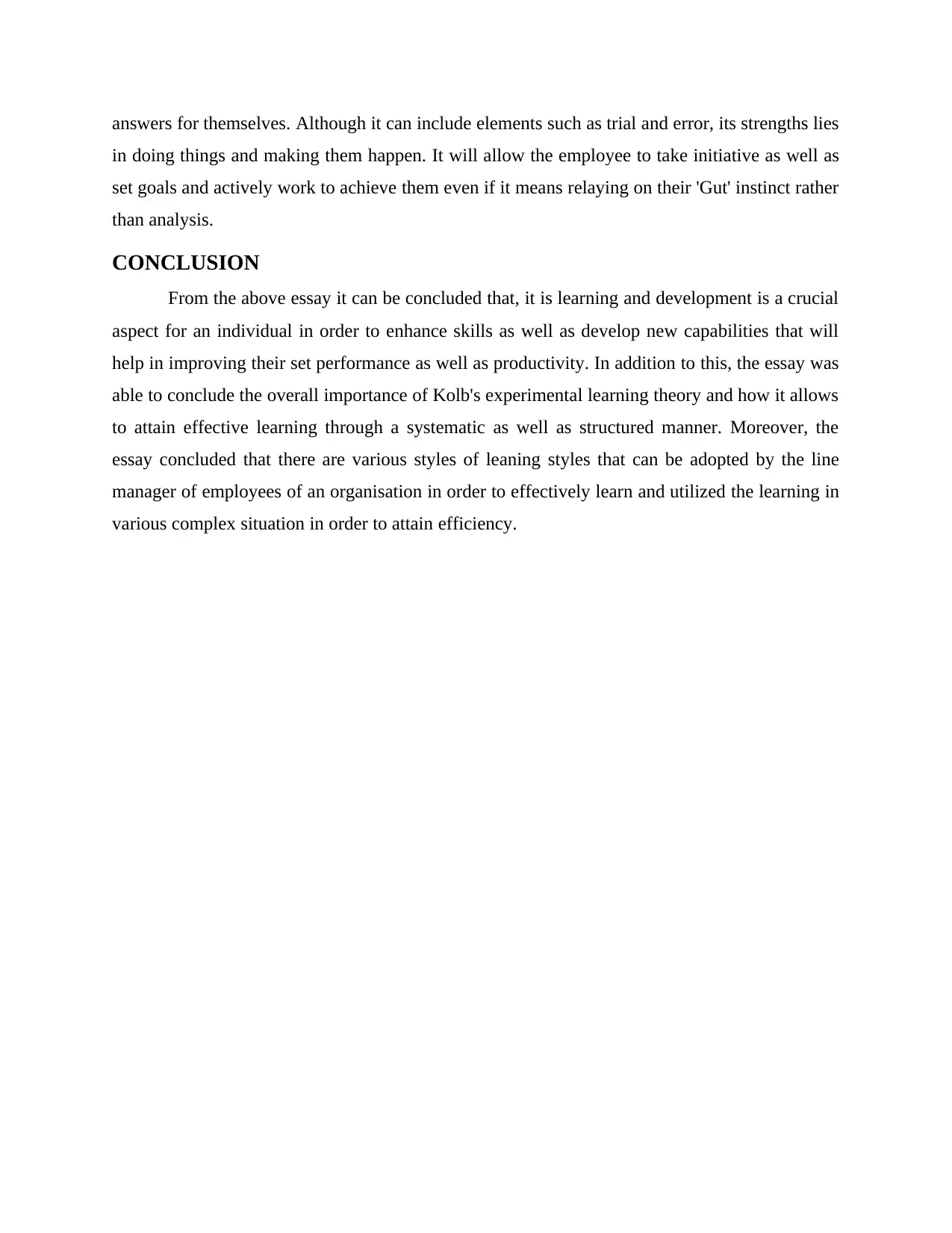
answers for themselves. Although it can include elements such as trial and error, its strengths lies
in doing things and making them happen. It will allow the employee to take initiative as well as
set goals and actively work to achieve them even if it means relaying on their 'Gut' instinct rather
than analysis.
CONCLUSION
From the above essay it can be concluded that, it is learning and development is a crucial
aspect for an individual in order to enhance skills as well as develop new capabilities that will
help in improving their set performance as well as productivity. In addition to this, the essay was
able to conclude the overall importance of Kolb's experimental learning theory and how it allows
to attain effective learning through a systematic as well as structured manner. Moreover, the
essay concluded that there are various styles of leaning styles that can be adopted by the line
manager of employees of an organisation in order to effectively learn and utilized the learning in
various complex situation in order to attain efficiency.
in doing things and making them happen. It will allow the employee to take initiative as well as
set goals and actively work to achieve them even if it means relaying on their 'Gut' instinct rather
than analysis.
CONCLUSION
From the above essay it can be concluded that, it is learning and development is a crucial
aspect for an individual in order to enhance skills as well as develop new capabilities that will
help in improving their set performance as well as productivity. In addition to this, the essay was
able to conclude the overall importance of Kolb's experimental learning theory and how it allows
to attain effective learning through a systematic as well as structured manner. Moreover, the
essay concluded that there are various styles of leaning styles that can be adopted by the line
manager of employees of an organisation in order to effectively learn and utilized the learning in
various complex situation in order to attain efficiency.
⊘ This is a preview!⊘
Do you want full access?
Subscribe today to unlock all pages.

Trusted by 1+ million students worldwide
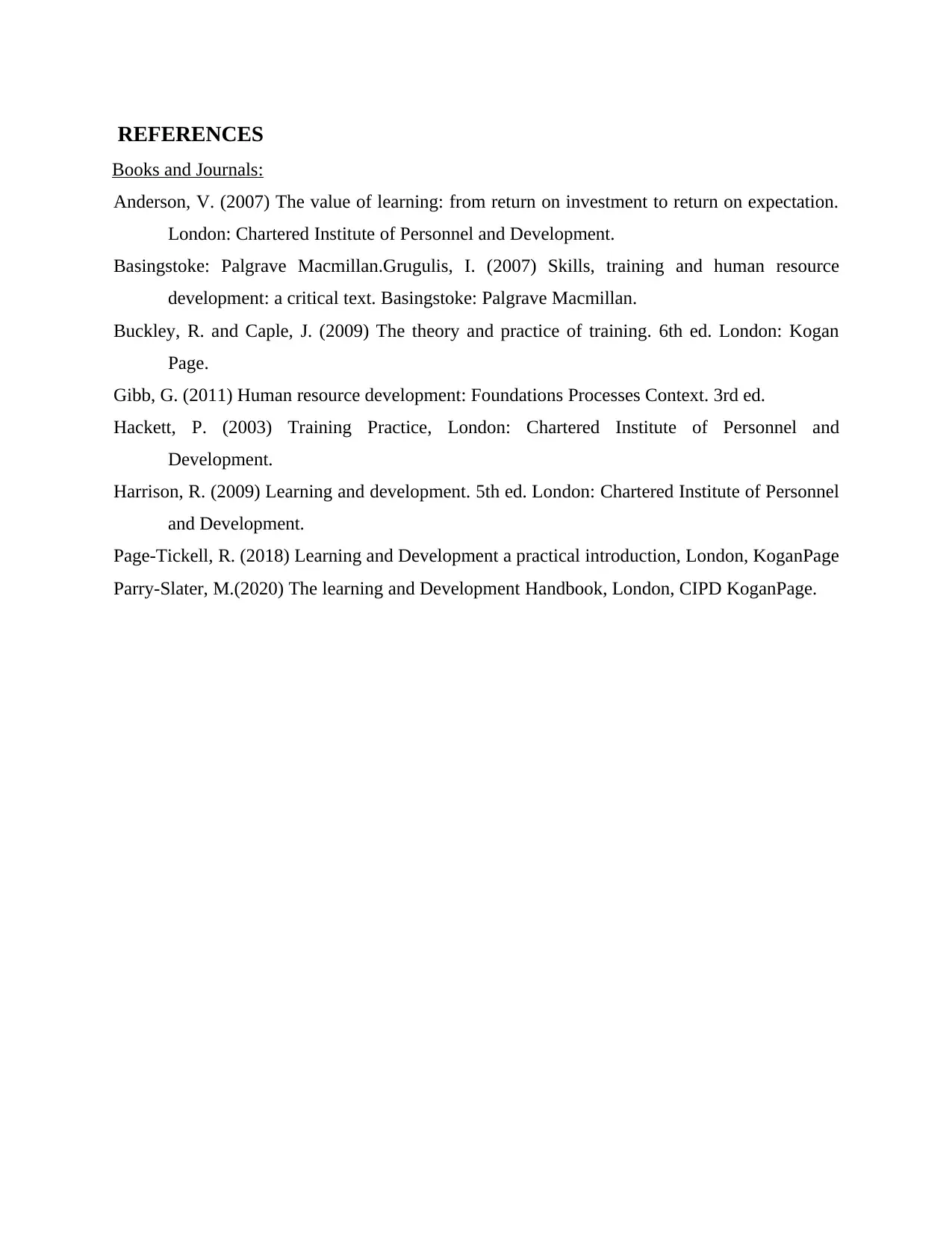
REFERENCES
Books and Journals:
Anderson, V. (2007) The value of learning: from return on investment to return on expectation.
London: Chartered Institute of Personnel and Development.
Basingstoke: Palgrave Macmillan.Grugulis, I. (2007) Skills, training and human resource
development: a critical text. Basingstoke: Palgrave Macmillan.
Buckley, R. and Caple, J. (2009) The theory and practice of training. 6th ed. London: Kogan
Page.
Gibb, G. (2011) Human resource development: Foundations Processes Context. 3rd ed.
Hackett, P. (2003) Training Practice, London: Chartered Institute of Personnel and
Development.
Harrison, R. (2009) Learning and development. 5th ed. London: Chartered Institute of Personnel
and Development.
Page-Tickell, R. (2018) Learning and Development a practical introduction, London, KoganPage
Parry-Slater, M.(2020) The learning and Development Handbook, London, CIPD KoganPage.
Books and Journals:
Anderson, V. (2007) The value of learning: from return on investment to return on expectation.
London: Chartered Institute of Personnel and Development.
Basingstoke: Palgrave Macmillan.Grugulis, I. (2007) Skills, training and human resource
development: a critical text. Basingstoke: Palgrave Macmillan.
Buckley, R. and Caple, J. (2009) The theory and practice of training. 6th ed. London: Kogan
Page.
Gibb, G. (2011) Human resource development: Foundations Processes Context. 3rd ed.
Hackett, P. (2003) Training Practice, London: Chartered Institute of Personnel and
Development.
Harrison, R. (2009) Learning and development. 5th ed. London: Chartered Institute of Personnel
and Development.
Page-Tickell, R. (2018) Learning and Development a practical introduction, London, KoganPage
Parry-Slater, M.(2020) The learning and Development Handbook, London, CIPD KoganPage.
1 out of 7
Related Documents
Your All-in-One AI-Powered Toolkit for Academic Success.
+13062052269
info@desklib.com
Available 24*7 on WhatsApp / Email
![[object Object]](/_next/static/media/star-bottom.7253800d.svg)
Unlock your academic potential
Copyright © 2020–2026 A2Z Services. All Rights Reserved. Developed and managed by ZUCOL.





